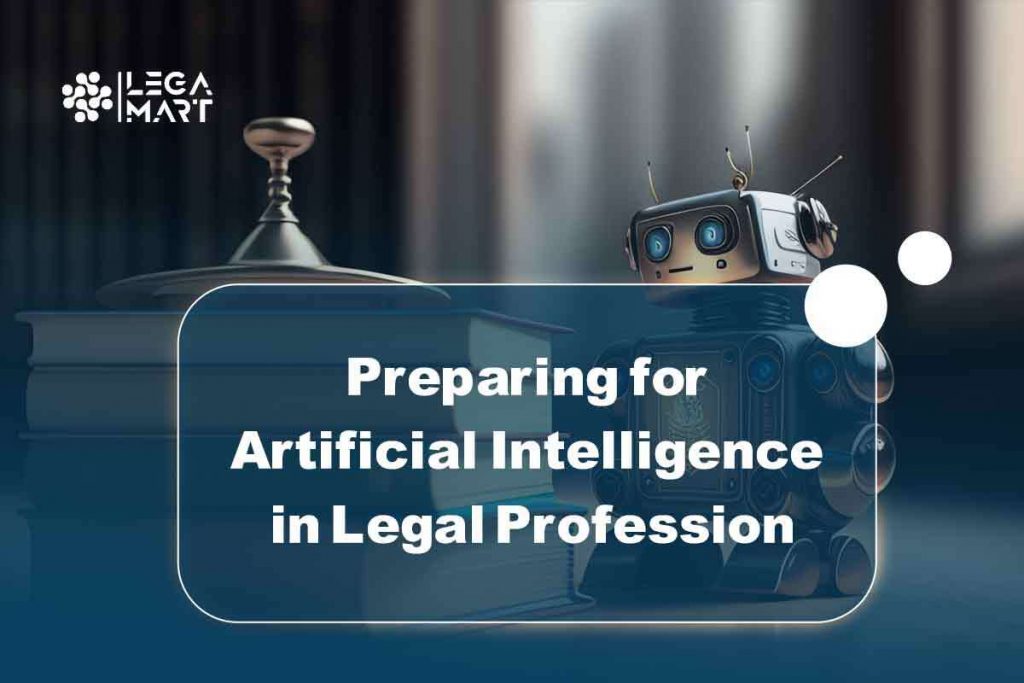- Introduction
- Artificial Intelligence in Legal Profession
- How are lawyers and law firms preparing for artificial intelligence in the legal profession?
- How are courts preparing for artificial intelligence?
- How can artificial intelligence influence courts?
- Ethical Considerations and AI in the Legal Sector
- Conclusion
One of the prestigious law firms in Kenya specialising in mergers and acquisitions (M&A) has struggled to keep up with its workload for quite some time. With multiple deals happening simultaneously, the firm struggled to review all necessary documents and provide timely advice to its clients. In an effort to streamline its processes, the firm widely invested in an AI platform that could help with due diligence.
At first, the platform seemed to work well due to its ability to review and categorise documents swiftly. However, as the deal progressed, the lawyers observed some notable errors in the work on the platform leading to delays and mistakes that could have serious consequences for their transactions. Upon scrutiny, the firm realised that it relied heavily on the AI platform and the lawyers had not taken time to review the documents by themselves thoroughly; and the platform had not been designed to handle the complexities of M&A transactions.
To address these issues, the firm began to take a more proactive approach to AI integration. It worked closely with the platform’s developers to customise it for M&A deals and implemented more rigorous quality control measures. The firm also invested in educating its lawyers on the ethical implications of AI and other AI-related issues.
The case served as a valuable lesson to law firms and lawyers, reminding them that preparing for AI in the legal profession was not just about embracing new technology but also about understanding its limitations and working to ensure that it was being used responsibly and ethically. This article, therefore, addresses tips on how legal professionals can capitalise on emerging technology to make their work more efficient.
Introduction
The emergence of artificial intelligence is set to bring about a profound shift in the legal industry, fundamentally reshaping how legal tasks are conceptualised, organised, and carried out. During the Pre-Covid 19 pandemic era, the legal industry was known for being one of the least receptive to digital transformation to the extent that most skilled lawyers relied heavily on manual processes, drawing mainly on their exceptional memory, extensive expertise, and rigorous education to carry out their duties.
Despite technology being a useful tool, it did not dictate how tasks were executed, ranging from dispensing legal counsel to composing or scrutinising contracts, constructing a case or presenting it in court. However, the situation is poised to transform as artificial intelligence gains momentum in revolutionising the legal profession worldwide.
In today’s era, AI has the potential to assist modern lawyers and the legal industry at large to perform a wide range of tasks with greater speed and precision; including in major tasks like gathering information, preparing cases, predicting litigation results, and streamlining document management.
Equally, if law firms could adopt appropriate technological tools, it can be easier for them to generate, analyse, and edit documents at a very fast pace as opposed to the previous practices. Additionally, there are certain areas where artificial intelligence can operate independently, yielding a remarkable increase in overall productivity. Thus, the big question here is whether the legal profession is prepared for AI.
Artificial Intelligence in Legal Profession
There are significant challenges in existing legal frameworks due to AI; thus, updating the legal framework to align with the emerging capabilities and potential hazards of AI is imperative. This requires collaboration between legal experts, technologists, and policymakers to ensure that laws are effective and responsive to the changing technological landscape. Most issues have arisen as a result of AI and needed legal intervention, including; –
- Liability: As AI systems become more autonomous and make decisions. It is unclear who should be held responsible when something goes wrong. Should it be the developer, the user, or the AI system itself?
- Privacy: AI systems collect and process large amounts of data, raising concerns about how that data is used and protected. The legal framework must provide clear guidelines for how data can be collected and used by AI systems and what rights individuals have to control their data.
- Bias and discrimination: AI systems are only as good as the data they are trained on, and if that data is biased, so is the AI system. A proper legal framework must address how AI systems should be fair and unbiased.
How are lawyers and law firms preparing for artificial intelligence in the legal profession?
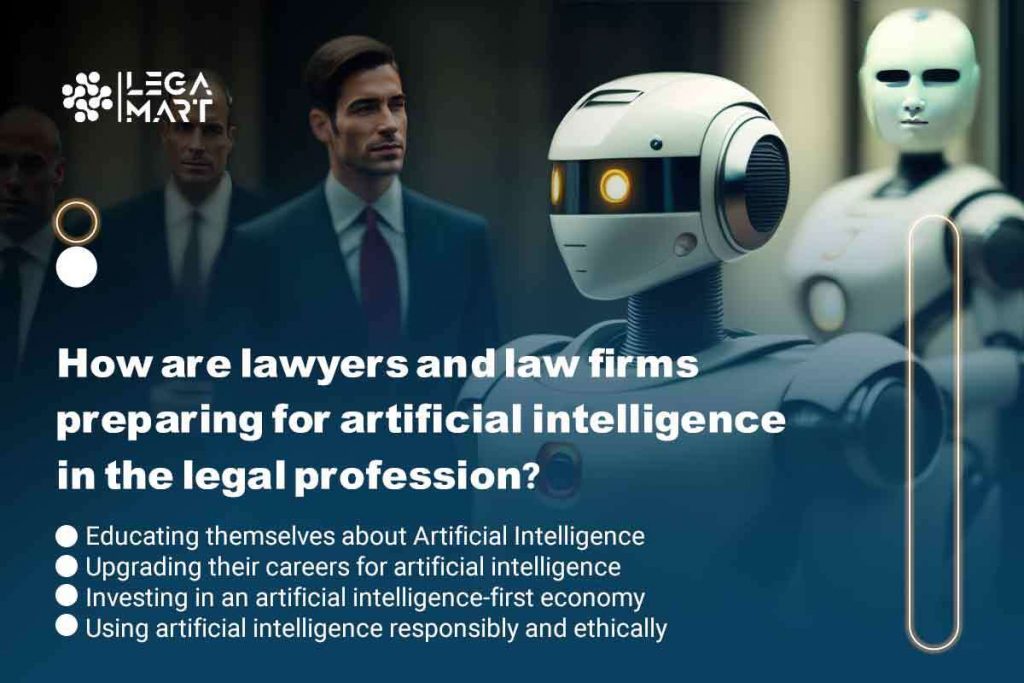
The increase in advancements and integration of AI tools in the legal industry requires lawyers to prepare for the changing landscape. Therefore, to adapt to these changes, lawyers need to emphasise becoming more proficient in technology and its functioning, developing an agile approach to new tools, embracing an expanded advisory role, and growing with the evolving legal culture.
Additionally, to comprehend a client’s business and the advantages and disadvantages of software tools, lawyers must understand how they function, the potential areas of error, and how to engage in conversations about these tools with technology experts such as developers. In essence, lawyers will need to become technologically adept to remain relevant and effective in the changing legal landscape by preparing for the impact of AI on the legal industry in various ways, including; –
Educating themselves about Artificial Intelligence
There are many ways that lawyers are using to educate themselves on AI issues. For example, lawyers can attend AI-related seminars and conferences to learn about the latest trends, challenges, and opportunities in the field; they can also attend numerous online courses and training programs available to learn about AI; and they can also work with law firms and legal tech companies that specialise in AI to gain hands-on experience and learn how to incorporate AI into their practice.
Upgrading their careers for artificial intelligence
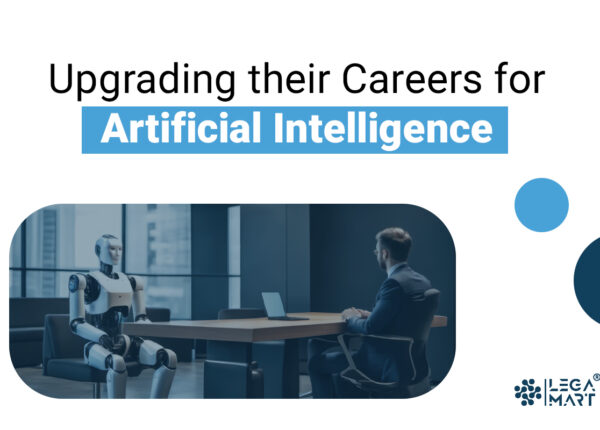
Lawyers are exploring ways to incorporate AI into their legal practice to improve efficiency and effectiveness. For example, most modern law firms are using AI tools to speed up the contract review process, automating repetitive tasks, E-discovery, documents automation, administrative tasks and Improve legal research. By incorporating AI into their work, lawyers can stay ahead of the curve and remain competitive in an AI-driven legal industry.
Investing in an artificial intelligence-first economy
Lawyers recognise the potential of an AI-first economy and invest in AI-driven companies and technologies. For example, some lawyers are investing in AI companies developing cutting-edge AI technologies and solutions that have applications in the legal industry and partnering with legal tech companies. Additionally, by staying on top of the latest AI trends and developments, lawyers can identify investment opportunities and help their clients navigate the new AI landscape.
Using artificial intelligence responsibly and ethically
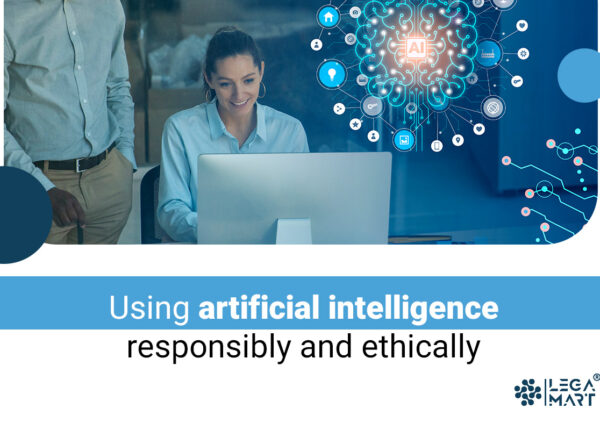
As AI becomes more advanced, there are concerns about its potential impact on society. Lawyers are working to ensure that artificial intelligence is used responsibly and ethically, and that legal frameworks are in place to protect individuals from the potential harm caused by AI.
This can be achieved in numerous ways, including; – protection of data that they collect and use for AI, conscious of potential biases in AI systems as well as upholding professional standards when using AI in their practice, includes ensuring that AI systems are accurate, reliable and used in a way that is consistent with legal ethics and professional responsibility.
How are courts preparing for artificial intelligence?
Courts worldwide are beginning to grapple with the implications of artificial intelligence (AI) and how it should be used in legal proceedings. For example, AI raises various questions for both courts and judicial officers, particularly, what can AI do to administer justice? On the other hand, most responsibilities done by courts and judicial officers are governed by the standards of proper procedure. Therefore, what exactly does this mean for those working with AI?
Most routine cases have a predictable outcome. Particularly, how most cases are handled, especially cases of civil and administrative nature, depends mainly on; the complexity of the information in a case and the degree of predictability of the outcome.
Generally, the role of courts and judicial officers is to process information whereby parties bring information to the court, transformations take place during the procedure, and the outcome is also information. Similarly, with AI, the court primarily receives digital submissions where parties provide data digitally, and if the outcome is predictable, case processing could be automated using AI, precisely because the outcome is largely or entirely certain. AI in the Legal Profession
How can artificial intelligence influence courts?
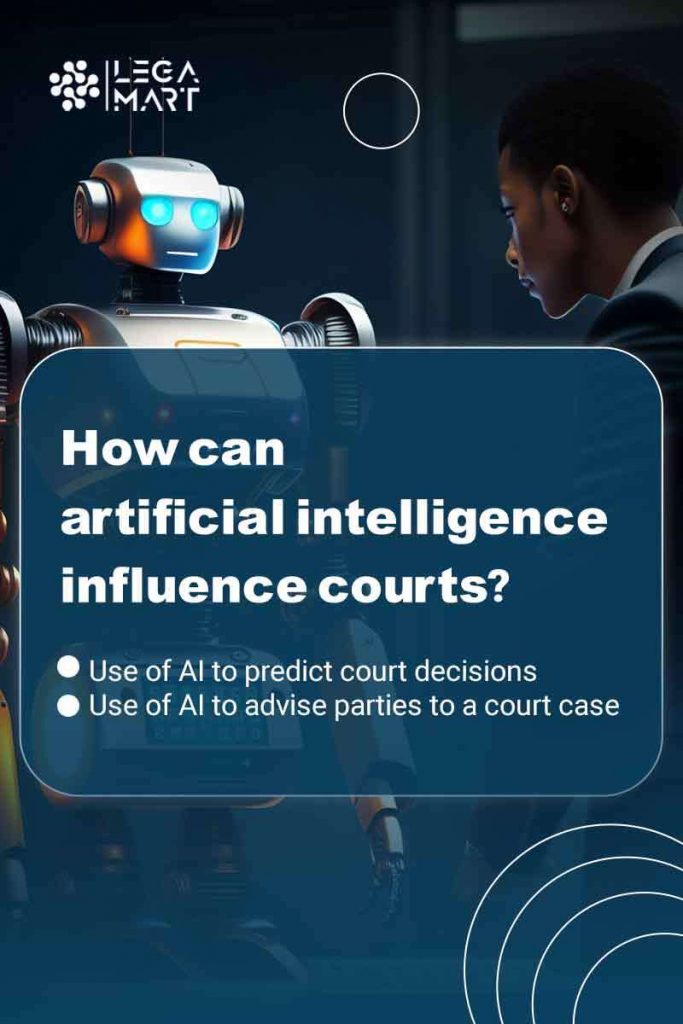
Various regulatory authorities are working together to promote regulations, principles, and guidelines aimed at regulating AI platforms within judicial systems. In addition, most courts are developing guidelines to address how artificial intelligence can be used in legal proceedings.
These guidelines may cover issues such as the admissibility of artificial intelligence-generated evidence, the use of AI in legal decisions, and the ethical considerations surrounding artificial intelligence. For example in the case of State v. Loomis, the use of a risk assessment tool in criminal sentencing was embraced, the full citation being STATE of Wisconsin, v. Eric L. LOOMIS 881 N.W.2d 749 (Wis. 2016)
In this case, Eric Loomis was convicted of fleeing the police and operating a vehicle without the owner’s consent. At sentencing, the judge considered a risk assessment tool called COMPAS (Correctional Offender Management Profiling for Alternative Sanctions), which is designed to predict the likelihood of recidivism.
Loomis argued that using COMPAS in his sentencing violated his due process rights because the tool’s proprietary algorithms and methods were not transparent and open to review. The defence also argued that using the tool was arbitrary and biased against the offenders.
The circuit court denied the motion, and the Supreme Court upheld the decision, stating that if used appropriately, the use of COMPAS risk assessment in sentencing does not infringe on a defendant’s due process rights. The court also found that the circuit court did not abuse its discretion in using the COMPAS risk score and considering read-in charges in the plea agreement.
Use of AI to predict court decisions
The use of artificial intelligence in court for prediction purposes is a controversial issue. Proponents argue that AI can provide valuable insights and predictions based on vast data, potentially leading to more accurate and fair decisions.
For example, an application claims to be able to predict decisions of the European Court of Human Rights. This tool utilises data from prior judgments to make predictions by employing natural language processing and machine learning to forecast the likelihood of the Court ruling and whether a specific provision of the European Convention on Human Rights (ECHR) has been breached in a given situation.
Another example is where AI algorithms could be used to predict the likelihood of recidivism in criminal cases, which could help judges determine appropriate sentences and reduce bias in the justice system. A good example is the application of artificial intelligence in some US states, where criminal judges utilise the Correctional Offender Management Profiling for Alternative Sanctions (COMPAS) tool to evaluate the likelihood of recidivism among defendants or convicts.
However, critics raise concerns about the potential for algorithmic bias and lack of transparency in the decision-making process. They argue that AI systems may perpetuate and even amplify existing biases in the data used to train them, leading to unfair or discriminatory outcomes. Additionally, using AI could undermine the discretion and judgment of judges and other legal professionals, potentially leading to a loss of accountability and oversight.
Use of AI to advise parties to a court case
AI systems that are capable of providing advice and guidance could be beneficial to individuals and potential parties involved in a court case. For example, artificial intelligence-powered legal assistants or chatbots could assist people in navigating the legal system, providing information on relevant laws and regulations, explaining legal terminology, and even offering guidance on the likelihood of success in a particular case.
Ethical Considerations and AI in the Legal Sector
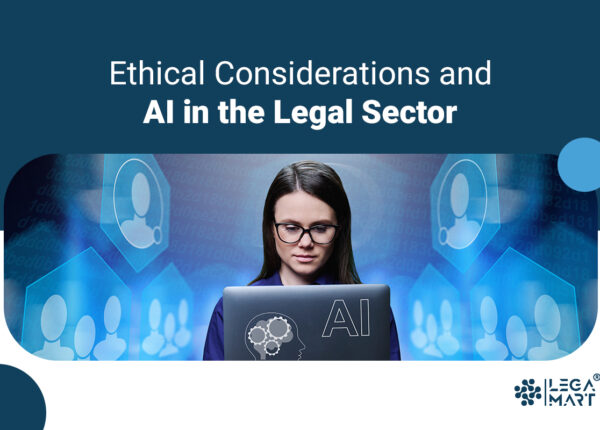
The use of AI in the legal sector also raises important ethical considerations. For example, there is a risk that AI algorithms could perpetuate bias and discrimination, particularly if the data sets used to train the algorithms are not diverse or representative. There is also a concern that AI could undermine the role of human judgment and discretion in the legal profession, potentially leading to a loss of jobs and expertise.
AI systems rely on vast amounts of data to learn and improve their performance, which may include sensitive information about individuals, such as their personal details, criminal history, and financial information. The collection and storage of this data can potentially expose individuals to data breaches or unauthorised access.
Therefore, it is important to ensure that any data used to train artificial intelligence systems is collected, stored, and processed in compliance with applicable data privacy regulations, such as the General Data Protection Regulation (GDPR) in the European Union.
Conclusion
The law and legal practice field has faced challenges in keeping up with the rapid advancements in technology, including the Internet, big data, and the digitisation of information and processes. Besides, as technology continues to accelerate, these challenges are likely to become even more pronounced. That is why preparing for artificial intelligence in the legal profession is crucial for the future of the legal sector. It is important to establish clear guidelines and regulations for developing and using AI in the legal sector.
This includes legal training professionals to work with AI, ensuring transparency and accountability in data processing methods, and implementing safeguards to prevent bias and discrimination. With careful planning and responsible implementation, artificial intelligence can be a valuable tool for the legal profession, improving access to justice and delivering better client outcomes.

